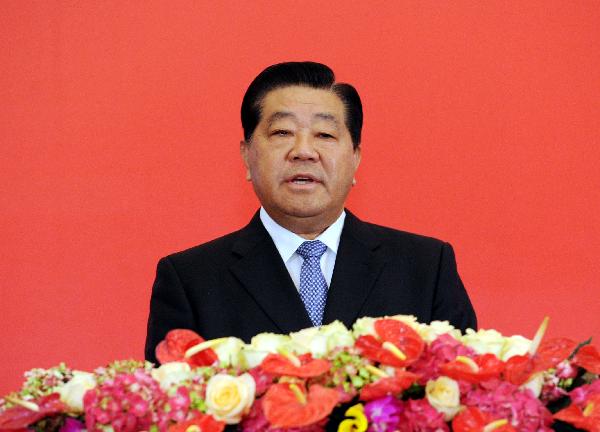
Jia Qinglin, member of the Standing Committee of the Political Bureau of the Communist Party of China (CPC) Central Committee, addresses the opening ceremony of the Cross-Strait Economic, Trade and Culture Forum, a regular forum between the Chinese mainland and Taiwan, held in Chengdu, capital of southwest China's Sichuan Province, May 7, 2011. Jia Qinglin and Kuomintang (KMT) honorary chairman Wu Poh-hsiung attended the opening ceremony. More than 400 representatives and experts from both sides attended the forum. (Xinhua/Rao Aimin)
CHENGDU -- The Cross-Strait Economic, Trade and Culture Forum, a regular forum between the Chinese mainland and Taiwan, opened Saturday in Chengdu, capital of southwest China's Sichuan Province.
Jia Qinglin, member of the Standing Committee of the Political Bureau of the Communist Party of China (CPC) Central Committee, and Kuomintang (KMT) honorary chairman Wu Poh-hsiung attended the opening ceremony.
Jia, also chairman of the National Committee of the Chinese People's Political Consultative Conference, said at the opening ceremony that the cross-Strait forum had become an important platform of "sincere communication" between members of the CPC and the KMT and people from various circles across the Strait.
The forum, proposed by leaders of the two parties and initiated in 2006, has undergone "extraordinary development," Jia said, adding that the previous six forums had played a guiding role in deepening cross-Strait exchanges.
He said topics of the forum, including the mainland's 12th Five-Year Plan (2011-2015) and Taiwan's "golden decade" blueprint (2011-2020), as well as further implementation of the cross-Strait Economic Cooperation Framework Agreement (ECFA) and educational, cultural and youth exchanges, are of great practical significance.
Jia said the implementation of the ECFA and its early harvest program, which took effect last September and this January respectively, had brought "tangible benefits" to people on both sides.
He said the peaceful development of cross-Strait relations had earned "more support and recognition" and it had become a mainstream public opinion
The two sides should continue to promote cross-Strait negotiations in order to ensure that "development fruits benefit more grassroots people," Jia said.
"Economic cooperation between the two sides has entered a crucial period that could make a difference," he said, adding that both sides have listed strengthening cross-Strait cooperation as an important part in their economic plans.
Jia said efforts should be made to improve the cross-Strait economic cooperation mechanism and upgrade its level so as to boost its benefits to the public and maintain a sound economic cooperation environment.
The cross-Strait investment protection agreement should be reached as soon as possible so as to offer more convenience for two-way investment, and negotiations on dispute settlement should be started soon in order to better protect interests of both sides' enterprises, he said.
Jia also urged realization of mainland tourists' individual travel to Taiwan before the end of June. Currently, mainland tourists are only allowed to visit the island in tour groups.
Moreover, Jia said small and medium-sized enterprises from both sides should strengthen cooperation and be given more support in refinancing, taxation and transfer of high-tech achievements, among others, so that their role of improving employment, incomes and people's livelihoods could be brought to a full play.
He said the mainland would also actively support cross-Strait nuclear power safety cooperation, which was proposed by Taiwan recently, and hoped that such negotiations would start soon.
Jia also called for consolidating cultural bonds between the mainland and Taiwan.
Wu of the KMT said there were two "bridges" -- economic cooperation and cultural exchanges -- between the mainland and Taiwan, both of which were "very important."
He said the forum's discussion would provide important reference to both sides for policy making.
Wu said a sound cross-Strait relationship was key to Taiwan's economic development which turned better in recent years.
He said he hoped that through signing of the ECFA's follow-up agreements, cross-Strait investment and trade barriers could be further removed so as to realize liberalization of currency and service trade across the Strait.
He also expressed his hope that the two sides should further increase the number of direct flights and mainland tourists' individual travel to the island could be realized at an early date.
Wu also expressed his condolences on the six mainland tourists killed at a train turnover accident at Alishan in southern Taiwan last month.
About 450 representatives and experts from both sides attended the two-day forum.
